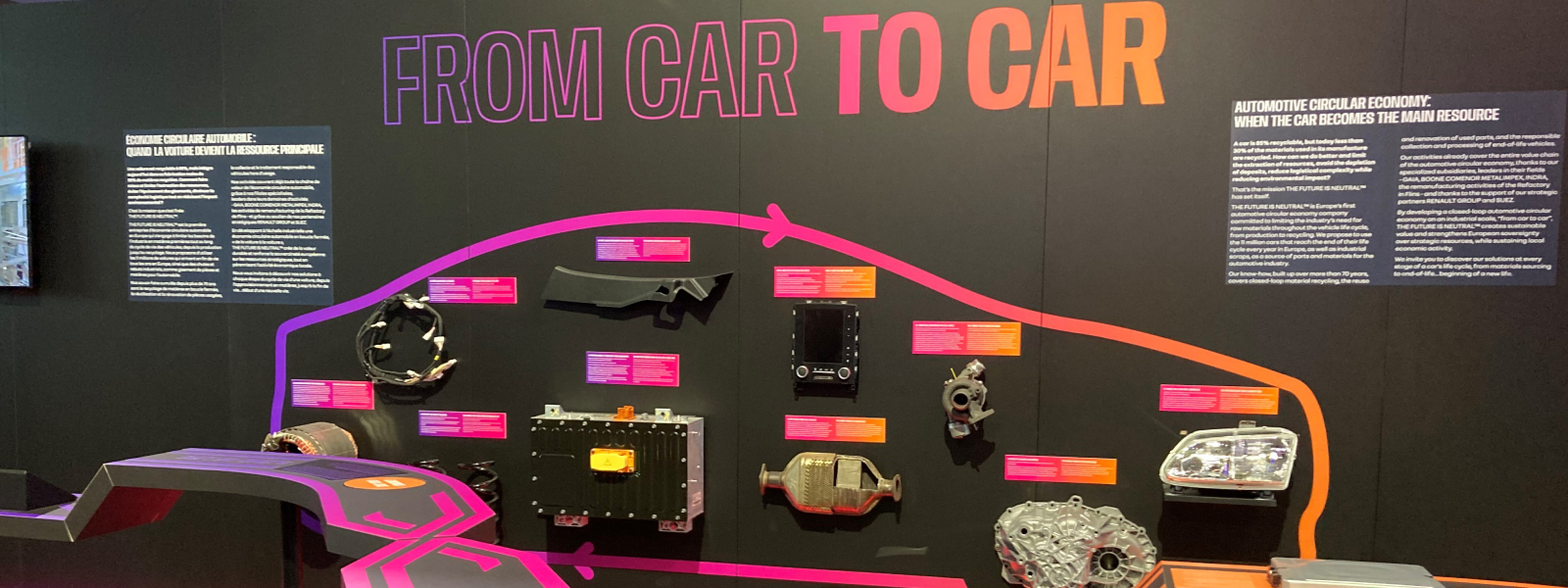

No, says Aurélien Bigo, a researcher and expert on the energy transition in transport, in his latest book, "Cars: fake or not? So where do the future challenges for mobility lie? Are cars still part of the equation? How are carmakers adapting to these changes? These were questions that punctuated the debate between Aurélien Bigo and Cléa Martinet, Director of Sustainable Development at Renault Group.
This joint interview was conducted in partnership with Usbek & Rica, the media that explores the future, a few months after the "Court for Future Generations" about the future of cars, organized at the ChangeNOW event.
Usbek & Rica - Recently, the President of the Republic, Emmanuel Macron, said "I love cars", a statement that echoes the love that many French people have for cars. How do you explain this both culturally and historically?
Cléa Martinet: I'm not going to comment on the President's speech, but this statement took me back to what Roland Barthes wrote about the DS in Mythologies (1957). He explains that cars are like cathedrals - magical objects, passionately designed by unknown artists and visited like magical objects.
In this book, in which he evokes both the steak and chips and the Nautilus, he places the 'car' as a figure, a symbol of progress, as it was understood in the 50s. The DS represented a form of perfection in terms of shape and material, an extremely smooth sheet of metal with aerodynamic curves. I don't know if cars are still synonymous with progress for the French today. On the other hand, it is associated with freedom, the freedom to move about as one pleases and to demonstrate one's social status. It is also a sine qua non for independence and access to employment outside big cities.
I think that President Macron wanted the car industry to be part of this fervor and this usefulness. This is an allusion to the fact that for a large part of the population, the car fulfils a need that is almost a public utility, hence the affection that many feel for their vehicle. We're often attached to what we need.
Usbek & Rica - Aurélien Bigo, you have written an essay entitled Voitures, Fake or not? (Tana éditions, 2023) which looks at the preconceived ideas surrounding cars. Is our attachment to cars fake?
Aurélien Bigo: There is no general truth on this subject. In any case, yes, there is a very strong car culture in France, which has also contributed to its development. The opposite is also true. The development of the car nurtures and contributes to car culture, and car culture contributes to the development of the car. Car culture is particularly varied: it is shared by both the elite and the working classes, and is disseminated through a variety of channels, including advertising, the media and the cinema. This may explain our attachment to, or even love of, the car.
However, this emotional attachment only concerns a proportion of motorists. And there is a broader attachment that is more to do with usage, for those who use the car and need it, because it is the only mode of transport to which they have access. It's both an attachment and a dependency.
As for the President's statement, it is interesting to note that it took place on the eve of the presentation of France's energy and climate strategy. The message is not aligned with environmental issues. On the other hand, it does reflect the proposed vision of a French-style ecology, an ecology of progress that is largely reflected in the shift from internal combustion cars to electric cars. It is an illustration of the desire to decarbonize through technology and not through use. With his "I love the car", he is announcing that this symbol will not be touched.

Usbek & Rica - And that's annoying?
Aurélien Bigo: Yes, the very documents produced by the General Secretariat for Ecological Planning explain that, yes, we do need very significant changes in usage. It's annoying that this isn't reflected in the public discourse at the highest level of government and, more generally, in public policy.
Cléa Martinet: We've talked a lot about our attachment to the car as an object, but I think that the President's statement also ties in with the car as a French industry. France is a car-producing country that faces many competitive threats. This is nothing new; I'm thinking, for instance, of the arrival on the market of Japanese cars after the second oil crisis in the 1980s. Today, it's China that intends to make its mark precisely in the energy transition segment, with electric vehicles.
On the other hand, the government measures that are about to be voted through (the ecological bonus, for example) clearly reflect a desire, both industrial and climatic, to repatriate the production of vehicles and the automotive industry to Europe, or even to France, where energy is carbon-free. Behind this "I love the car" we can hear a "I love the French car industry".
Usbek & Rica - What would it take to make cars desirable again?
Aurélien Bigo : Sobriety ! I have the feeling that the challenge lies more in making sobriety desirable in the transition than in making the car desirable. The car dominates mobility. If I go back to the elements put forward in the discourse on French-style ecology, the ecology of progress, there has indeed been a lot of talk about industry and its relocation, supported by a financed and competitive ecology. This discourse borrows from the language of economics, not that of biodiversity or climate science.
Having said that, I'm all in favour of the electrification of vehicles, and I think it's absolutely essential, provided that they are more fuel-efficient. This is essential if we are to achieve our climate objectives. Relocation is just as relevant from an economic, environmental and social point of view.
By pursuing transition levers that are compatible with economic growth, we are overlooking others. Electrification only covers two of the five levers raised by the national low-carbon strategy.
Usbek & Rica - What are the others?
Aurélien Bigo: The first lever would be to reduce the distances travelled. This means making everyday journeys closer to home, and looking at regional planning, changing lifestyles and longer-distance travel. The second lever is modal shift, i.e. using planes or cars less and switching to walking, cycling or public transport. The third lever involves filling up vehicles, in particular by carpooling. Nine out of ten motorists drive alone. Another lever would be to reduce the energy consumption of vehicles. And here we find electrification. But this is not the only aspect to consider - the transformation of the car fleet will take a long time. We could consider moving towards smaller, lighter, more aerodynamic vehicles that are more economical in terms of energy and resources, or adopting eco-driving, in particular by going to 110 km/h on motorways. We have fallen behind on our 2030 targets. We will have to combine the electrification of the car fleet with a great deal of sobriety.
Usbek & Rica - Cléa Martinet, apart from electrification, what else is Renault committed to in terms of transition?
Cléa Martinet: On the question of the vehicle fleet transition, we are currently looking into the possibility of e-fuel, a synthetic fuel made from renewable or low-carbon electricity and carbon dioxide from capture. As Aurélien explained, renewing the vehicle fleet takes a long time indeed.
On the question of sobriety, we have set up Mobilize, a business unit entirely dedicated to mobility by the kilometer, in other words to use rather than ownership. The brand does not sell cars, but kilometers and services. The aim is to explore every possible way of replacing the car with a mobility service. Mobilize has developed Europe's first fleet of electric car-sharing vehicles, Zity, which is present in France, Spain and Italy. That's around 2,000 vehicles. Of course, we'd like to be the first with a larger fleet, but the car-sharing business model is still in its infancy. It's a reality of the sector and of usage.
Still regarding sobriety, next year Mobilize will be launching two small vehicles for private individuals and professionals, Mobilize Duo and Bento. You can park three of them in a single parking space!
We also plan to contribute to the decarbonization of energy. For example, by using the car's battery, which has a significant carbon footprint, as an energy store. We could then charge our R5 with green electricity and return it to the grid using vehicle-to-grid technology.
Usbek & Rica - As you said, batteries have a considerable carbon footprint, not least because of the extraction and refining process. Are you thinking about recycling these minerals so that when batteries are changed every eight years, they don't end up in the bin?
Cléa Martinet: First of all, we have opted for repairable batteries. Our battery modules are not cast in resin, they are detachable and therefore replaceable. It's important to remember that a battery represents up to half the carbon footprint of an electric vehicle. So no, we're not talking about throwing batteries away, but rather about prolonging their use for as long as possible.
Secondly, we have a cradle-to-cradle approach, which creates closed loops for strategic materials. We see the end-of-life car as a resource. We dismantle it, clean it up and make it safe so that we can recover as many materials as possible, including the battery, for recycling and re-injection into the production of new cars. This approach will apply not only to battery minerals such as cobalt, lithium and nickel, but also to copper, plastics and metals.

Usbek & Rica. Aurélien Bigo, you have written that while electricity is the future of the car, the car is not necessarily the future of mobility. Where do you see the future of mobility?
Aurélien Bigo: The use of private cars is under-optimised. Some vehicles weigh a tonne and a half and carry an average of 100 kilos. In fact, the car is primarily carrying its own weight. This oversizing is also reflected in the speed offered by the new vehicles currently on sale. They can travel at speeds of up to 170-180 kilometres an hour, whereas in France the legal limit is 130.
The risk of oversizing also arises with electric vehicles, particularly in terms of batteries and their range. A long-range battery reassures people, even though we know that long journeys are rare. This upward calibration of batteries has a financial and ecological impact. It's a double whammy: when we ask people what's holding them back from going electric, the answer is the price and the fear of low battery range. You can't combine great range with much lower cost.
Over 98% of our journeys are less than 80 km from home. As far as possible, cars should be calibrated for everyday use and other alternatives should be considered for exceptional use and long-distance travel. For example, developing a sufficient rail network, public road transport, car-sharing or, as Cléa mentioned, developing car-sharing. Of course, provided that we organise peak full stops.
Cléa Martinet: We think of mobility as an ecosystem. The value chains for our industry are multiplying: electric vehicles, the circular economy, mobility services. They require new skills and new players from the digital, chemical, and recycling sectors. We can no longer do everything on our own. The future of mobility lies in inventing new business models based on partnerships and ecosystems.
For example, we have just signed a joint venture with Volvo and CMA CGM to decarbonize the transport of goods. In concrete terms, Volvo is contributing its highly efficient last-mile delivery solution. For our part, we are offering an electric vehicle designed to be a light commercial vehicle, so that it will once again be welcome in cities (with a Low Emission Zone, editor's note). The two of them will act as a bridge between maritime freight (CMA CGM) and the city.
The future of mobility is a collective one.




